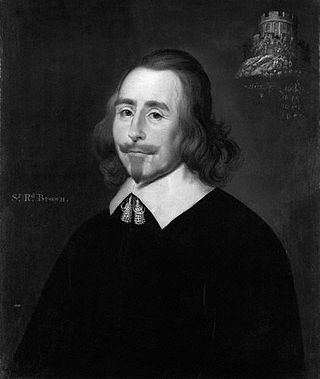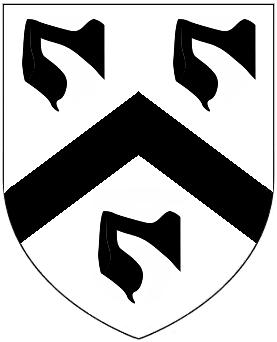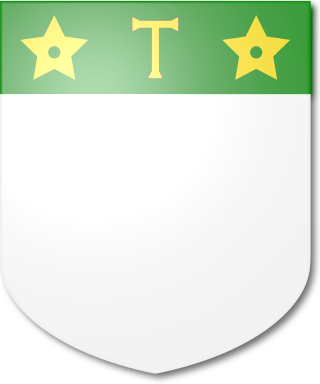Related Research Articles

Baron Farnham, of Farnham in the County of Cavan, is a title in the Peerage of Ireland. It was created in 1756 for John Maxwell, who had previously represented Cavan Borough in the Irish House of Commons. John Maxwell's son, the second Baron, was created Viscount Farnham in 1760 and Earl of Farnham in 1763. Both titles were in the Peerage of Ireland but became extinct when he died childless in 1779. His brother and successor, the third Baron, was again created Viscount Farnham in 1781 and Earl of Farnham in 1785. These titles were also in the Peerage of Ireland. His son, the second Earl, sat in the House of Lords as an Irish Representative Peer from 1816 to 1823. However, he had no children and on his death in 1823 the viscountcy and earldom became extinct.
Baron Bruntisfield, of Boroughmuir in the City of Edinburgh, is a title in the Peerage of the United Kingdom. It was created in 1942 for the Scottish Conservative politician and former Vice-Chamberlain of the Household, Sir Victor Warrender, 8th Baronet. The Warrender family descends from George Warrender. He was Lord Provost of Edinburgh and represented Edinburgh in Parliament. In 1715 he was created a baronet, of Lochend in the County of Haddington, in the Baronetage of Great Britain. His grandson, the third Baronet, fought at the Battle of Minden in 1759, represented Haddington Burghs in the House of Commons and served as King's Remembrancer of the Court of Exchequer from 1771 to 1791. He was succeeded by his son, the fourth Baronet. He sat as a Member of Parliament for Haddington Burghs, Truro, Sandwich, Westbury and Honiton and notably served as a Lord of the Admiralty from 1812 to 1812. In 1822 Warrender was admitted to the Privy Council. On his death the title passed to his younger brother, the fifth Baronet. His grandson, the seventh Baronet, was a Vice Admiral in the Royal Navy. He was succeeded by his son, the eighth Baronet, who was raised to the peerage as Baron Bruntisfield, of Boroughmuir in the City of Edinburgh, in 1942. As of 2010 the titles are held by the latter's grandson, the third Baron, who succeeded in 2007. He is a retired officer in the British Army and investment banker.

There have been ten baronetcies created for persons with the surname Browne, six in the Baronetage of Great Britain, three in the Baronetage of Ireland and one in the Baronetage of Nova Scotia. Only one creation is extant as of 2010. Three of the creations were for members of the Browne family headed by the Viscount Montagu.
There have been three baronetcies created for members of the Glyn family, two in the Baronetage of Great Britain and one in the Baronetage of the United Kingdom.

There have been three baronetcies created for persons with the surname Chapman, one in the Baronetage of Great Britain, one in the Baronetage of Ireland and one in the Baronetage of the United Kingdom. Two of the creations are extinct while one is extant.
There have been nine baronetcies created for persons with the surname Lloyd, three in the Baronetage of England, three in the Baronetage of Great Britain and three in the Baronetage of the United Kingdom. Two of the creations are extant as of 2010.

The Shuckburgh Baronetcy, of Shuckburgh in the County of Warwick, is a title in the Baronetage of England. It was created on 25 June 1660 for John Shuckburgh, the eldest son of Sir Richard Shuckburgh, (1594–1656) Member of Parliament for Warwickshire and a supporter of the Royalist cause in the Civil War, who was knighted before the Battle of Edgehill by Charles I.
There have been four baronetcies created for persons with the surname Musgrave, one in the Baronetage of England, one in the Baronetage of Nova Scotia, one in the Baronetage of Ireland and one in the Baronetage of the United Kingdom. As of 2014 two of the creations are extant.

There have been three baronetcies, all in the Baronetage of England, created for members of the Mansel family, which played a major role in the early re-settlement of the Gower Peninsula, in Glamorgan, Wales. Only one creation is extant as of 2008.

The Buckworth, later Buckworth-Herne, later Buckworth-Herne-Soame Baronetcy, of Sheen in the County of Surrey, is a title in the Baronetage of England. It was created on 1 April 1697 for John Buckworth, High Sheriff of London in 1704. The second Baronet sat as Member of Parliament for Weobley. The third Baronet was Assistant Gentleman Usher to George II. The fifth Baronet was Gentleman-Pensioner and Exon of the Guard during the reign of George III. He married Anne, daughter of Paston Herne, of Haveringland Hall, Norfolk, and assumed by Royal licence the additional surname of Herne. The sixth Baronet assumed in 1806 by Royal licence the additional surname of Soame in compliance with the will of Sir Peter Soame, 4th Baronet, of Thurlow. The ninth Baronet was a member of the Shropshire County Council.

There have been three baronetcies created for persons with the surname Carew, two in the Baronetage of England prior to 1707, one in the Baronetage of Great Britain.
There have been three baronetcies created for persons with the surname Foulis, one in the Baronetage of England and two in the Baronetage of Nova Scotia.

There have been two baronetcies created for persons with the surname Drury, one in the Baronetage of England and one in the Baronetage of Great Britain. Both creations are extinct.

The Fludyer Baronetcy, of The City of London, was a title in the Baronetage of Great Britain. It was created on 14 November 1759 for the merchant, banker and politician Sir Samuel Fludyer, with remainder in default of male issue of his own to his brother Thomas Fludyer and his issue male. The second Baronet was Member of Parliament for Aldborough. The title became extinct on the death of the fifth Baronet in 1922.
The Hartstonge Baronetcy, of Bruff in the County of Limerick, was a title in the Baronetage of Ireland. It was created on 20 April 1681 for Standish Hartstonge, an English-born judge who sat on the Irish Court of Exchequer, and who had inherited estates at Bruff from his mother's family, the Standishes. The second Baronet, his grandson, was a member of the Irish House of Commons for Kilmallock, Ratoath and St Canice. The third Baronet was a member of the Irish Parliament for County Limerick. The title became extinct on his death in 1797, when the Hartstonge estates passed by inheritance to the Earl of Limerick.
Sir Richard Lucy, 1st Baronet was an English politician who sat in the House of Commons variously between 1647 and 1658.
The Clarges Baronetcy, of St Martin's in the Fields in the County of Middlesex, was a title in the Baronetage of England. It was created on 30 October 1674 for Walter Clarges, subsequently Member of Parliament for Colchester and Westminster. He was the son of Sir Thomas Clarges. Sir Walter was succeeded by his son, Thomas, the second Baronet. He represented Lostwithiel in Parliament. He was succeeded by his grandson, Thomas, the third Baronet, the son of Thomas Clarges. The third Baronet sat as member of parliament for Lincoln. The title became extinct on the death of his son, Thomas, the fourth Baronet, in 1834.

There have been three baronetcies created for persons with the surname Meredith, one in the Baronetage of England, one in the Baronetage of Nova Scotia and one in the Baronetage of the United Kingdom. Two of the creations are extinct while one is dormant.
There are four extinct baronetcies created for persons with the surname Norton: two in the Baronetage of England, one in the Baronetage of Ireland and one in the Baronetage of Nova Scotia.

There have been two baronetcies created for members of the Pryse family, one in the Baronetage of England and one in the Baronetage of the United Kingdom. Both creations are extinct.